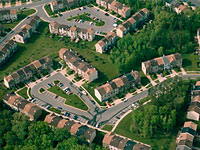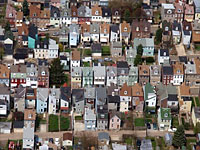California is rebounding, but Florida, not so.
Poor Florida. The state that is home to Disney World, key lime pie and the Daytona 500 hasn't had much to crow about when it comes to real estate in recent years. Sorry to break it to Sunshine Staters, but they shouldn't be expecting a rebound anytime soon either.
More from Forbes.com:
• Cities Where Home Values Will Rise in 2011
• Cities Where Home Values Will Fall in 2011[Click here to check home equity rates in your area.]
That's according to Local Market Monitor (LMM), a Cary, N.C.-based real estate research firm that crunched the numbers for our list of the best and worst cities for home values in 2011. One list includes the 10 cities where home values are expected to rise the most in 2011, and the other the 10 cities where they are expected to fall the most.
LMM tracks 315 American real estate markets, assessing values and applying Investment Suitability ratings based on multiple factors. For the Forbes lists, LMM President Ingo Winzer and his researchers started with a U.S. Census-defined list of Metropolitan Statistical Areas with populations of 500,000 residents or more. They then analyzed key economic factors that directly affect housing markets: unemployment and job growth rates, as reported by the Bureau of Labor Statistics. LMM tracks real estate markets' valuations based on the theory that markets go through cycles.
[See the Cities With the Best Long-Term Housing Gains]
"We see a predictable pathway that home prices follow," explains Winzer. "If you know where in the cycle a market is, you can make some predictions about where it will go in the next one, two, three years."
Assessing the progression of those market cycles means comparing average "actual" home prices to equilibrium home prices--meaning where prices should be in the absence of market distortions that result from speculation and mismatches between population growth and new home construction. Another tool is peak-to-trough analyses, which factors in the number of single-family and multi-family housing permits active in each city, as recorded by the U.S. Census Bureau.
The result is a Top 10 list made up of cities boasting an outlook for job growth and rebounding economies in 2011. Not surprisingly then, Washington D.C. (No. 7), and its nearby hubs make this list, thanks to a steady supply of government jobs.
California touts the most metros on the Top 10 list. San Jose (No. 1), Santa Ana (No. 2) and San Diego (No. 5) offer housing markets where property prices are expected to rise steadily over the next three years. Los Angeles didn't crack the top 10, but this sprawling metropolis does offer the prospect of appreciation, despite a building boom and bust that was similar to Florida's.
[See the Best Places to Live in America, 2010 Edition]
"The big difference between Florida and Southern California ... is people are moving into Southern California, but they're not moving to Florida," asserts Winzer. "It was speculative retirement and vacation condos--things that were bought by people not living there and now not moving there, wanting to sell their empty condos because they can't rent them out."
Unfortunately for these snowbirds, seven Florida cities land on the Bottom 10 list. Deltona-Daytona Beach, Lakeland and Orlando take the top three spots. Expect further home price drops in all of these markets over the next two years, leveling out by 2014.
A lack of jobs--the construction industry had a huge job market presence here--coupled with a deluge of homes on the market, both from owners and banks, means these markets will take a long time to recover.
Many Western states are in the same bind as Florida, thanks to building boom and busts centered around retirement and vacation home speculation. Arizona metros like Tucson (No.8) and Nevada's Las Vegas (No.5) likely have a few years to go before prices stop dropping.
"In general they're attractive markets for retirement, and eventually they'll recover ... but over the next five years or so they're going to have a tough time filling all the empty pieces of real estate built there," says the LMM president.
What does all of this news mean for you, the homeowner? If you are living in a market that's still depreciating in value and intend to stay in that market, don't panic and sell your home. Wait it out instead.
However, if you live in one of these depreciating markets and already plan on scramming in the next few years, do it now--it's probably going to get worse before it gets better. Just don't plan on your property selling quickly, since these markets are suffering from an abundance of inventory.
If you've had hopes of setting up new digs in one of these rebounding markets, do it now. Prices are only going to go up.
[See the Towns Where You Can Get Land for Free]
"There are going to be very few markets over the next five years that will be good investment markets, and few to no markets where prices will go up 10% per year," stresses Winzer, emphasizing that no market has a shortage of real estate. "We are probably at a point now where we [LMM] are underestimating how well the Top 10 markets are going to do. ... What you might see in some of these markets are fair, steady gains of 4% or 5% a year, the way they used to before there was a real estate boom. "
Cities Where Home Values Will Rise in 2011
These are the Metropolitan Statistical Areas where home values are expected rebound the most this year, based on data compiled by Local Market Monitor.
San Jose, Calif.
Tony Casanova/iStockphotoAverage Home Price: $511,186
12-Month Forecast: 3% increase
Three-Year Annualized Forecast: 2% increase
Santa Ana, Calif.
David Liu/iStockphotoAverage Home Price: $449,396
12-Month Forecast: 3% increase
Three-Year Annualized Forecast: 2% increase
Bethesda, Md.
Getty ImagesAverage Home Price: $384,775
12-Month Forecast: 2% increase
Three-Year Annualized Forecast: 2% increase
Pittsburgh, Pa.
ThinkstockAverage Home Price: $168,762
12-Month Forecast: 2% increase
Three-Year Annualized Forecast: 2% increase
San Diego, Calif.
ThinkstockAverage Home Price: $336,679
12-Month Forecast: 2% increase
Three-Year Annualized Forecast: 2% increase
Click here to see the full list of Cities Where Home Values Will Rise in 2011
Cities Where Home Values Will Fall in 2011
These cities appear to be in for further home price drops this year, according to data from Local Market Monitor.
Daytona Beach, Fla.
ThinkstockAverage Home Price: $146,234
12-Month Forecast: 11% decrease
Three-Year Annualized Forecast: No change
Lakeland, Fla.
Joey Champion/iStockphotoAverage Home Price: $139,734
12-Month Forecast: 7% decrease
Three-Year Annualized Forecast: 2% increase
Orlando, Fla.
Joey Champion/iStockphotoAverage Home Price: $180,900
12-Month Forecast: 6% decrease
Three-Year Annualized Forecast: 2% increase
Boise City, Idaho
ThinkstockAverage Home Price: $162,016
12-Month Forecast: 7% decrease
Three-Year Annualized Forecast: 3% increase
Las Vegas, Nev.
ThinkstockAverage Home Price: $144,636
12-Month Forecast: 5% decrease
Three-Year Annualized Forecast: 2% increase
Click here to see the full list of Cities Where Home Values Will Rise in 2011
ADVERTISEMENT

___
Popular Stories on Yahoo!:
• Worst Email Mistakes to Make at Work
• Six Sources of Free Tax Help
the-best-and-worst-cities-for-home-values-in-2011: Personal Finance News from Yahoo! Finance - Los Angeles-Platinum Triangle-Beverly Hills-Bel Air-Holmby Hills-Sunset Strip-Hollywood Hills-luxury estates-homes for sale-listings-Realtor-Real Estate - http://www.ChristopheChoo.com
Posted on: Beverly Hills Real Estate-Beverly Hills Homes For Sale














No comments:
Post a Comment